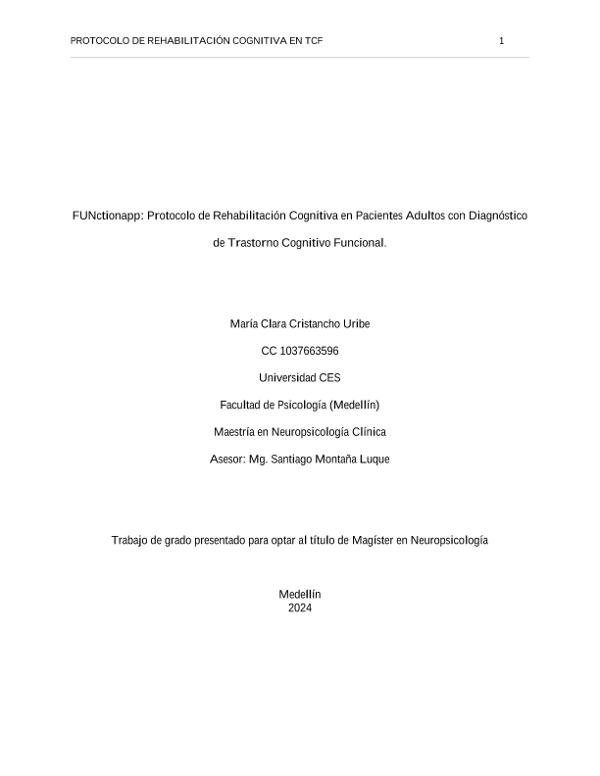FUNctionapp: Protocolo de rehabilitación cognitiva en pacientes adultos con diagnóstico de trastorno cognitivo funcional
Abstract
El trastorno Cognitivo Funcional (TCF) es una condición ampliamente desconocida en el área clínica caracterizada por quejas cognitivas subjetivas que no son objetivables y presencia de inconsistencias internas entre el desempeño en las pruebas cognitivas y en las habilidades de la vida diaria, además de malestar subjetivo. Su prevalencia es difícil de determinar debido a que este es subdiagnosticado, sin embargo, existe una aproximación que habla de que al menos un 24% de los pacientes con quejas cognitivas pueden estar presentando TCF. Comúnmente es confundido por los profesionales de la salud con deterioro cognitivo leve, predeterioro cognitivo leve y quejas subjetivas de memoria. Hasta la actualidad, se desconoce de intervenciones a nivel de rehabilitación neuropsicológica en pacientes con esta patología. OBJETIVO: diseñar un programa de rehabilitación cognitiva para pacientes con trastorno cognitivo funcional que cursan con quejas atencionales y ejecutivas, mediante tecnologías de la información y la comunicación. METODOLOGÍA: El programa consta de 22 sesiones, de las cuales 5 estarán enfocadas en atención teniendo en cuenta el Modelo de Sholberg y Mateer, 13 sesiones orientadas a funciones ejecutivas por medio del Modelo Gioia, Isquith, Guy y Kenworthy y, previo y posterior a la intervención, se cuenta con una evaluación neuropsicológica y funcional de dos sesiones cada una, además de un programa de psicoeducación a pacientes, familias y público en general. RESULTADOS ESPERADOS: se espera que con este protocolo haya disminución de las quejas cognitivas de los pacientes con Trastorno Funcional y mayor concientización de la enfermedad por parte de los públicos de interés. Palabras Clave: trastorno Cognitivo Funcional, Función Ejecutiva, Atención, Rehabilitación Neuropsicológica. Abstract Functional Cognitive Disorder (FCD) is a widely unknown condition in the clinical field, characterized by subjective cognitive complaints that are not objectively observable, besides that, it is distinguished by the presence of internal inconsistencies between performance in cognitive tests and daily life skills, along with subjective distress. Its prevalence is challenging to determine as it is underdiagnosed; however, there is an estimation suggesting that at least 24% of patients with cognitive complaints may be experiencing FCD. It is commonly confused by healthcare professionals with mild cognitive impairment, pre-dementia, and subjective memory complaints. To date, there is a lack of knowledge regarding neuropsychological rehabilitation interventions for patients with this pathology. OBJECTIVE: design a cognitive rehabilitation program for patients with functional cognitive disorder experiencing attentional and executive complaints, utilizing information and communication technologies. METHODOLOGY: the program consists of 22 sessions, with 5 focusing on attention based on the Sholberg and Mateer Model, 13 sessions oriented towards executive functions using the Gioia, Isquith, Guy, and Kenworthy Model, and pre- and post-intervention neuropsychological and functional evaluations, along with a psychoeducation program for patients, families, and the general public. EXPECTED RESULTS: it is hoped that this protocol would lead to a reduction in cognitive complaints in patients with Functional Disorder and increase the awareness of the condition among the relevant audiences. Keywords: functional Cognitive Disorder, Executive Function, Attention, Neuropsychological Rehabilitation.Impacto
Collections


